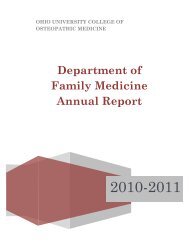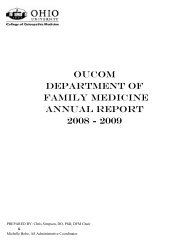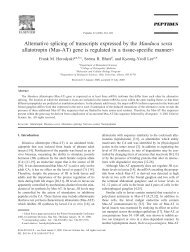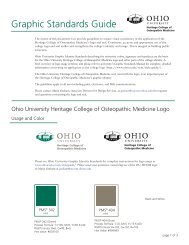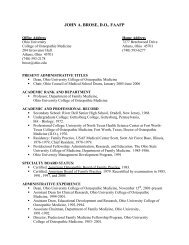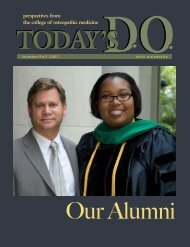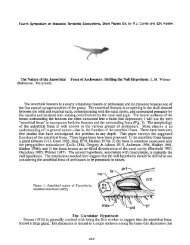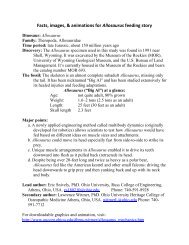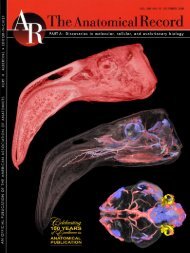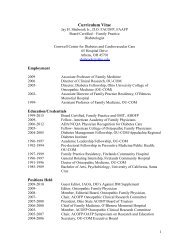DO - Ohio University College of Osteopathic Medicine
DO - Ohio University College of Osteopathic Medicine
DO - Ohio University College of Osteopathic Medicine
Create successful ePaper yourself
Turn your PDF publications into a flip-book with our unique Google optimized e-Paper software.
A Family-Friendly Specialty<br />
Lori Gordley, D.O (‘03), loves children, but that’s not the<br />
only reason she chose pediatrics. The flexibility it provides<br />
cemented her decision.<br />
“Lifestyle went into my choice, and pediatrics is good for<br />
physicians who have families. I don’t have children yet, but<br />
the ability to manage my schedule is important to me,” said<br />
Gordley, a pediatrics resident at Cincinnati Children’s Hospital.<br />
More graduates like Gordley are looking to balance family and<br />
career, and they’re realizing that pediatrics <strong>of</strong>fers flexibility.<br />
The average full-time pediatrician works about 50 hours a<br />
week, which is considerably less than some medical specialties.<br />
In addition, more pediatricians work part time than physicians<br />
in any other specialty. The percentage <strong>of</strong> pediatricians reporting<br />
they work part time has increased from nearly 11 percent in<br />
1993 to 20 percent in 2004, reports the American Academy<br />
<strong>of</strong> Pediatrics, and 26 percent <strong>of</strong> pediatricians versus 14<br />
percent <strong>of</strong> all physicians have worked part time at some<br />
point in their careers.<br />
“You’re going to work hard, but you’re not going to be<br />
beaten into the ground,” says Anderson <strong>of</strong> the American<br />
Academy <strong>of</strong> Pediatrics. “You make an impact on families’<br />
lives, but you have time for your own family.”<br />
This flexibility is appealing to women, who are entering<br />
the field in unprecedented numbers. Women made up<br />
about 20 percent <strong>of</strong> the pediatric workforce in 1970 and<br />
about 40 percent in 1990, according to the American<br />
Medical Association. Today, they represent more than 50<br />
percent <strong>of</strong> the workforce, a historic first for any specialty<br />
in the United States.<br />
Pediatricians haven’t always had the ability to manage their<br />
schedules, however. The pediatrician’s role was very different<br />
when Backes was practicing in the years following his<br />
graduation from the Kirksville <strong>College</strong> <strong>of</strong> <strong>Osteopathic</strong><br />
<strong>Medicine</strong> in 1972. He recalls working long hours and running<br />
from hospital to hospital to treat children.“There weren’t<br />
many pediatricians then, so we were always on call,” he says.<br />
“It was a very challenging time.”<br />
Many pediatricians say the reward and flexibility their field<br />
provides makes up for the fact that pediatrics is one <strong>of</strong> the<br />
lowest-paying medical disciplines. The average pediatrician<br />
earns just more than $143,000 compared to $230,000 and<br />
up for obstetrics/gynecology and general surgery. Even family<br />
medicine practitioners, at nearly $150,000, make more.<br />
Considering the rising cost <strong>of</strong> malpractice insurance and<br />
heavy student loan debt many graduates are saddled with in<br />
their early years, it stands to reason that some graduates<br />
may be drawn to more lucrative specialties. Others, however,<br />
see the long-term promise <strong>of</strong> job satisfaction.<br />
“I really like what I’m doing, and I’m going to enjoy getting<br />
up and going to work every day,” Gordley says. “Knowing<br />
that, I don’t mind not making as much money. You have to<br />
decide what’s most important.”<br />
For Abbas, it’s not about the money, either. “I thought about<br />
my kids and that I wanted to choose a specialty where I could<br />
be there for them. It’s more important for me to see my<br />
family rather than having more money,” says Abbas, who<br />
has two children, Jad, 6, and Carabelle, 3.<br />
Preventive <strong>Medicine</strong><br />
In pediatrics, education extends beyond the patient; a<br />
pediatrics practice is a perfect platform for reaching both the<br />
child and parent–children in terms <strong>of</strong> educating them about<br />
staying healthy and safe, and parents in terms <strong>of</strong> teaching<br />
them how to reinforce this message to their children. The<br />
multigenerational reach has made pediatrics especially<br />
attractive to some graduates.<br />
“Children are at risk because they’re dependent entirely on<br />
the parent,” says Thomas Clark, D.O., chair <strong>of</strong> OU-COM’s<br />
Department <strong>of</strong> Pediatrics. “It’s important for us to be an<br />
advocate for the child while educating parents about ways to<br />
keep their children healthy.”<br />
For example, Clark continually reinforces to his students the<br />
importance <strong>of</strong> talking to parents about childhood immunizations.<br />
“Younger pediatricians aren’t as aggressive about immunizations<br />
because they didn’t see all these kids die from diseases,” he<br />
says. “We need to be more aggressive about advocating for<br />
children to get immunizations.”<br />
Abbas, who earned a master’s degree in public health, talks<br />
to parents about everything from preventing sickness and<br />
injury to issues involving discipline. To this end, Abbas plans<br />
to develop a parenting class that residents near Tripler Army<br />
Medical Center can attend. This type <strong>of</strong> class is especially<br />
relevant on a military base, where many parents are young<br />
and <strong>of</strong>ten far from family.<br />
“Good parenting skills can make a big difference in a child’s<br />
health and psychological development, and we need to make<br />
sure we’re helping parents on all levels,” Abbas says.<br />
Celeste Wallace, D.O. (‘02), who is an assistant pr<strong>of</strong>essor<br />
in OU-COM’s Pediatrics Department and practices with<br />
Montgomery-Reagan, also was drawn to primary pediatrics<br />
for its preventive nature. Whether it’s hygiene or diet and<br />
exercise, Wallace has found that many children will not head<br />
down a healthy path if they don’t learn the basics early.<br />
“Once they’re adults, it’s too hard to reprogram them. It’s<br />
easier to start with young minds,” she says.<br />
The drive to make an impact fits right in with Wallace’s<br />
other reason for choosing pediatrics: “I love children, and<br />
you have to do what you love.”<br />
More Doctors in the Making<br />
Although Pestak, a native <strong>of</strong> Cleveland, has two more years<br />
<strong>of</strong> medical school and three years in a residency, she already<br />
knows she’d like to practice pediatrics in <strong>Ohio</strong> and be a part<br />
<strong>of</strong> this burgeoning pr<strong>of</strong>ession.<br />
22 www.oucom.ohio.edu



